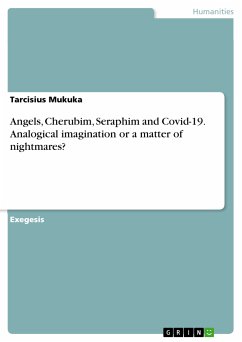Exegesis from the year 2020 in the subject Theology - Biblical Theology, grade: 1.0, Kwame Nkrumah University, course: Religious Studies, language: English, abstract: This exegetical exercise attempts a hermeneutics or interpretation of one of the most misunderstood genres of both the Hebrew Bible and the Christian in the role of angels, Cherubim and Seraphim. The author argues that the narrative that describes them is meant to jog our analogical imagination so that our finite mind can try to picture what it is like to be in the presence of the divine. The use of symbols such as animals, sounds, numbers etc is a means of pushing our finite mind to its utmost limit so as to get as close as it can to what is infinite. This is particularly at a time of crisis or dystopian times such as the current Covid-19 pandemic in order to provide hope that evil is not winning but that whatever discombobulation we may be undergoing are but the birth pangs of a new heaven and a new earth. What are described as angels were not mythic creatures. They were human messengers of God. When the concept migrates into Greek mythology, angels, like Hermes, are still messengers but they are more supernatural than terrestrial. When Greek mythology and Hebrew mythology about angels, they gave rise to all kinds of pictorial representations. The purpose of the representations was to stretch our minds and in the case of the Bible to help us reflect on the supernatural and to shore our belief that the Supernatural is still in charge. In relation to the Cherubim and Seraphim, the Hebrew Bible does not even call them angels. It reserved the word angel for human messengers as in Gen 18. Whatever way they are presented in art, they are aids for analogical imagination rather than creatures to keep us awake at night or with which to frighten children. They do not exist outside our analogical imagination. Like Greek drama, when we read the narrative, we are not meant to be bystanders but participants. In Isaiah 6, for instance, you are not meant to observing Isaiah but you are a co-participant in his drama. If he is afraid, you are also afraid. If he is dejected, you are also dejected. If at the end there is a silver lining at the end of his horizon, that should go for you too. The narrative is meant to have a cathartic effect.
Dieser Download kann aus rechtlichen Gründen nur mit Rechnungsadresse in A, B, BG, CY, CZ, D, DK, EW, E, FIN, F, GR, HR, H, IRL, I, LT, L, LR, M, NL, PL, P, R, S, SLO, SK ausgeliefert werden.









